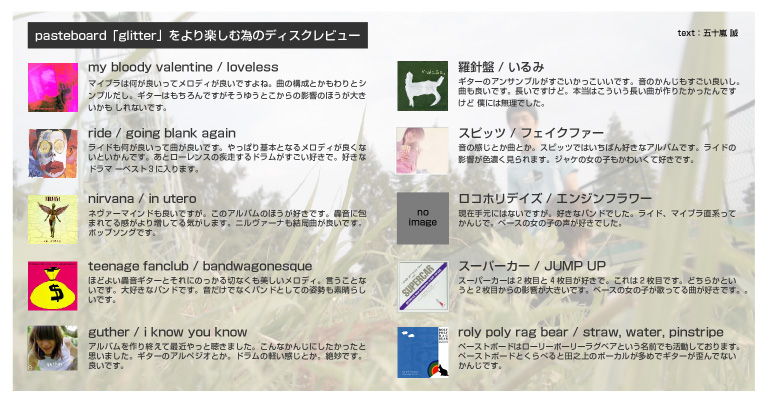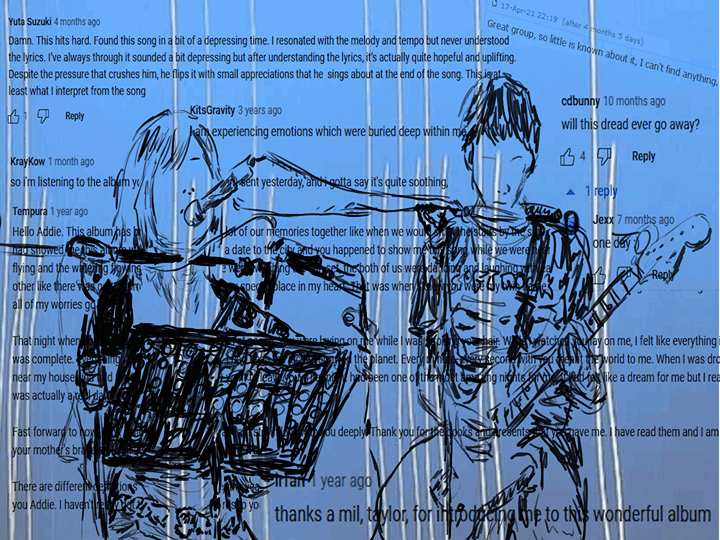“Hello, Addie. This album has brought me back to a lot of our memories together like when we would sit at the stairs by the side of our school when the bell rang. The first time you showed me this album was when we went on a date to the city… Thank you for always being with me and in my heart Addie. I love you.“
I found this comment underneath a YouTube upload of Japanese shoegaze duo Pasteboard’s debut album, Glitter. A cursory scroll through the comments on this upload and others will surface a plethora of similar stories: childhood trips to see grandparents, dedications to friends, reassurances that sadness will go away one day. A sense of comfort and nostalgia pervades – but not the kind of directionless nostalgia you might retreat to when the world is unbearable. Instead, it’s the kind of remembering that motivates you, that reminds you that community can be found if we look for it.
But despite this sense of community and adoration among their modern fans, Pasteboard themselves remain somewhat mysterious. With only one full-length record released in 2005 plus a handful of songs released on various compilations, their catalog is thin. And Pasteboard itself was really a side project – Igarashi Makoto and Tanoue Mihoko, the two musicians who created the band, were more visible as the indie-pop duo Roly Poly Rag Bear. Under that name, they released music throughout the 2000s and gained enough of a following to play the 2005 edition of Taiwan’s Formoz Festival – which, according to a contemporary Taipei Times article, drew 10,000 attendees.
By comparison, it’s hard to tell what the critical and commercial response to Pasteboard looked like. Unlike some of their old labelmates on the now-defunct abcdefg* records, Pasteboard does not maintain much of a social media presence. One band-run blog documenting Pasteboard’s activities hasn’t been updated since 2007, and searching through their posts returns a slew of dead links – though the Roly Poly Rag Bear blog now has an update regarding the recent Glitter re-issue. A few thinkpieces on Glitter have been written in the past few years, but little Japanese coverage remains accessible online, and I couldn’t find any contemporary English-language coverage at all.

But it is possible to catch glimpses of how Pasteboard saw themselves. The band’s old homepage, accessible via the Wayback Machine, features a page where Igarashi describes the records that inspired Glitter. It’s an interesting window into their creative identity, as Igarashi cites influences from across a broad spectrum of indie rock: canonized bands like My Bloody Valentine, Nirvana, and The La’s sit next to more left-field choices, like the twee indietronica of Guther’s I Know You Know or Rashinban’s heady, psychedelic Irumi. In discussing the latter record, Igarashi writes, “I wanted to make a long song like they do but I just couldn’t.” It’s a tantalizing glimpse into where Pasteboard might have gone if they’d continued creating music…
They didn’t. But while Pasteboard was only active for a brief time, Glitter has slowly spread via file-sharing sites, forums, and forum-adjacent social media platforms like Reddit and Tumblr. I was introduced to the record through the YouTuber and musician Hazel, who mentioned it in an episode of her podcast Pod Spirit. Over email, she tells me that a friend who habitually dug through torrent sites recommended the album to her in 2012, and it quickly became a recurring favorite.
“Listening to the band now a decade on is always a bit of a re-centering for me,” she says. “That record is a testament to how the best songs are often the simplest. Most of their songs have hardly more than three chords, and the production is similarly bare, but there’s a sort of overpowering artistic honesty there.”
Glitter’s simplicity is, indeed, one of its most immediate and appealing qualities. The opening song, “Breakbeats,” begins with a circular guitar riff reminiscent of Morse code or a radio signal. After four repetitions, the song breaks open, with soaring crash cymbals above fuzzy blankets of shifting guitar. The verses stay in one chord, while Igarashi sings a repetitive, bone-simple melody; the chorus is just as simple, with a basic chord progression and a one-word refrain. But “Breakbeats” is magical not in spite of but because of its simplicity. Its thick guitar textures and lumbering backbeat provide a roaring, physical backdrop for its melody’s meditative bliss; every piece of the song is perfectly aligned. It’s lean, direct, elemental.
“Breakbeats” feels like it’s been carefully honed to a sharp point, and the rest of Glitter follows suit. Pasteboard isn’t shy about their influences – the soft-loud dynamics of “Cacao” recall Nirvana, while the jangly “Flipper” feels like a lost album track by The La’s or Supercar – but they’re able to fit those influences into a cohesive vision of their own. Nowhere is this clearer than in the middle of the record, when the band sequences the rowdy “Shoegazer” and the swooning, delicate “Slowdive” back-to-back. The first song’s rollicking energy literalizes the joy of making music, of being the one who shoegazes; the second is painfully tender and romantic, turning the invocation of the titular band name into a declaration of starry-eyed love. Together, their shared emotional ground overcomes any sonic incongruity. They’re two complementary aspects of a larger, album-length attempt to capture the feeling of being joyfully lost in a guitar tone or a drum fill. Glitter is a record made by music nerds, for music nerds; it’s music about the experience of being in love with music.

Over Zoom, I spoke with Brock Pierce, whose LA-based label 7th Heaven recently released vinyl and cassette reissues of Glitter, as well as a deluxe digital release with assorted bonus tracks. Those physical copies sold out within mere hours.
Pierce makes a similar point when I ask why the album connected with him: “I always refer to it as a love letter, because it seems like a love letter to shoegaze. And weirdly, that was the first shoegaze record I really got into… It kind of kick-started me going down the shoegaze rabbit hole.”
Pierce was introduced to Glitter when his friend, the musician Sundots, sent him the album in late 2019. The song “Flipper” caught his attention due to its relaxed, comforting vibe. Then, the COVID-19 pandemic began. “It sounds so cliché,” he says, “But just being stuck inside the house, all I could really do was obsess on that album.”
He dove through auction sites for more music, uncovering rarities like “Snowsheep” and “June,” and became preoccupied with the idea of reissuing the album. But while Pasteboard’s music still lives online, information on the band is harder to track down. He notes that, in an early attempt to make the reissue happen via a different label, he wrote a handwritten letter to an address linked to abcdefg* records. Three months later, the letter came back, unopened.
But Pierce kept trying. After founding 7th Heaven and building up a release catalog, he managed to contact Igarashi directly in late 2022. From there, the reissue finally began to come together. When I ask why he was so adamant about reissuing Glitter, Pierce says, “When I [started] the label, I was like, ‘Oh, one day I hope I can put out Pasteboard.’ That was the peak goal…even if they were super niche, I would put it out anyway, just because I want it for myself [and] because of how much it means to me.”
He says he returns to the album often, whenever he needs comfort; it reminds me of how Hazel describes return listens to Glitter as a “recentering,” and how the online community around the record feels so focused on warm, positive memories. Whenever I listen to the record, I feel it, too. There’s something grounding about it. The repetitive guitar riffs on “Breakbeats,” the melancholy interplay between Igarashi’s voice and the ornate instrumental lines on “Squall,” the bubbly “la-la-las” that close out “Flipper” – it all feels effortless and easy. Pierce’s dedication to making the reissue happen makes sense. Glitter soothes and nourishes, in the way that sunlight does.

Some of the few surviving photos of a Pasteboard performance were taken in December 2005, when they played a free show at the Apple store in Nagoya. Through the camera lens, the sleek, spotless interior of the store is turned abstract and psychedelic; in the most striking image, Igarashi is photographed through a glass barrier, making him look like he’s dissolving into blue light. Another full-band photo emphasizes the contrast between the blue lights above them and the yellow lights in the other sections of the store, making it look as if Pasteboard was transplanted from another dimension entirely. Even in their own time, the band seems mysterious and otherworldly.
There are very few interviews with Pasteboard that are still accessible online; during my research, I was only able to find two. The first was published on the now-defunct website Indiesnews.com; this seems to have been a small site with only two or three regular contributors, based on their About page. The second was featured on Aipi, a social media project that the tech company Nexon ran until 2009. For many, Nexon might be better known as the publisher of MapleStory, a free-to-play MMORPG that’s utilized more and more predatory monetization tactics over the last decade – echoing larger trends on an increasingly corporate internet.
Aipi’s interview with Pasteboard was published in March 2006, when these market forces weren’t quite so overt. Pasteboard existed during the brief window of time after the internet had become a naturalized part of life for many users, but before online methods of music discovery and community-building were fully taken over by algorithm-driven corporate interests. This is an era, after all, in which Igarashi created a whole page on Pasteboard’s website specifically to direct listeners to other bands that they might like, and to describe how and why they inspired his own creative process. In this moment, the web still seemed like it might democratize media and art, like it might collapse the distinction between major and minor; like it might bring people closer together.
I think about those YouTube comments, devoted to positive memories and emotions, finding community across time and space. I think about how their music has spread not through a Spotify algorithm or a strategic ad placement, but through a digital version of that analog phenomenon, word-of-mouth. I think about how, in the Aipi interview, Pasteboard offers a striking response to a simple question:
Q: What kind of moment should someone listen to “Shoegazer?”
A: When they’re staring at the sky.
In retrospect, these details take on a sense of poignancy. Pasteboard’s particular place in history means that they represent something unique for modern listeners – the memory and the promise that the internet could destroy distance, could bring disparate traditions and musical ideas together. They represent nothing more and nothing less than infinite, skybound possibility.
Thank you to Naomi Cui for translating Pasteboard’s old website, and for translating and providing valuable context for the Aipi interview. Thank you to Hazel and Brock Pierce for agreeing to participate in this article.
Listen to the deluxe edition of Pasteboard’s Glitter on bandcamp or wherever you get your music. You can also check out the new music video 7th Heaven recently released for “Freesoul” over on YouTube.
